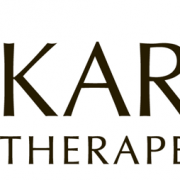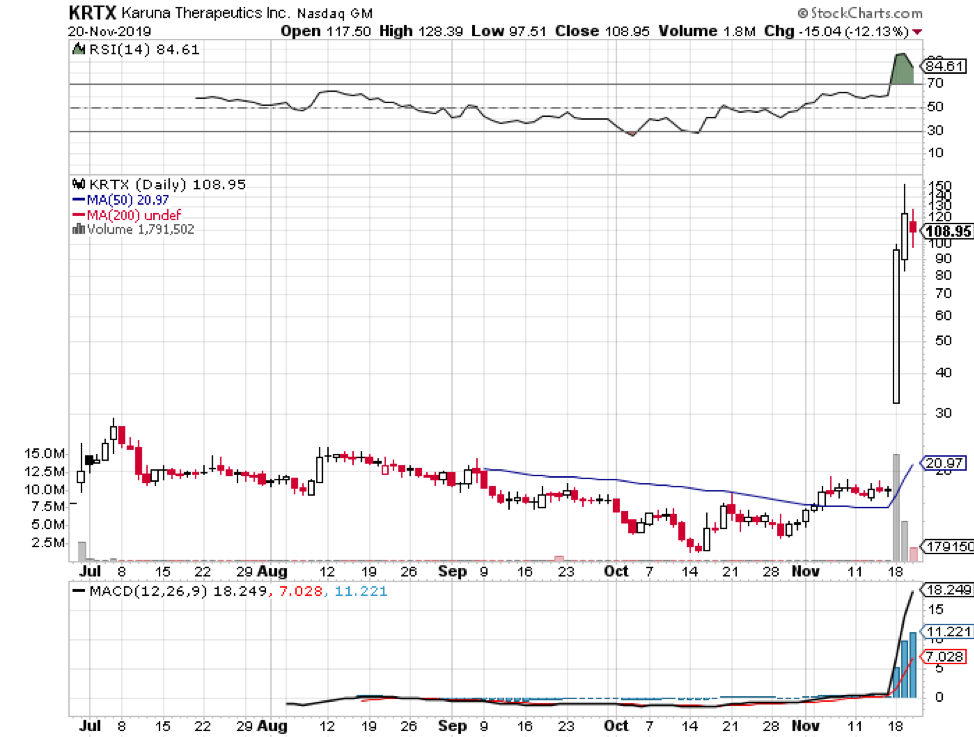Why Karuna Therapeutics is the Big One That Got Away
In many respects, buying the shares of small biotech companies is a lot like purchasing lottery tickets. Look no further than Karuna Therapeutics (KRTX), which has just soared sevenfold on the back of wildly successful phase II trials for its schizophrenia drug KarXT.
While it is too late to buy (KRTX), it is illustrative of what is going on in the space with ever-increasing frequency. And the great news for you and me is that biotech is only months into a meteoric move that could last for decades.
KarXT is the next “gamechanger” in the field of schizophrenia. Why is this important? In the United States alone, schizophrenia already affects roughly 2.7 million people or almost 1% of the population. Needless to say, this condition makes handling relationships and maintaining jobs virtually impossible.
With its tendency to become a recurring condition as one of its key defining features, schizophrenics need recurring treatment as well. To make matters worse, the conditions are distinct from one patient to another. Hence, it no longer comes as a surprise that over a third of people afflicted by this condition do not respond to the antipsychotic treatments available in the market today.
As for the treatments that do take effect, the side effects associated with the drugs also hinder the day-to-day activities of the patients causing them to discontinue taking it altogether. Currently, one of the most popular antipsychotic drugs used to treat schizophrenics is Johnson and Johnson’s (JNJ) Invega Sustenna. Based on its 2019 revenues so far, the drug is projected to be on pace to hit the projected sales of $3.3 billion by the fourth quarter.
In comparison, Karuna’s KarXT functions on muscarinic receptors that respond to acetylcholine, which is basically an organic chemical found in the brain. Meanwhile, JNJ’s drugs focus on dopamine and serotonin receptors. This primary difference between the two drugs puts Karuna’s drug on the lead. However, Karuna is not the first in looking into muscarinic receptors. In 2016, Allergan (AGN) paid Heptares Therapeutics $3.3 billion in an effort to license drugs similar to KarXT.
What really inspired excitement though is the tolerability of KarXT. Since the majority of antipsychotic drugs on the market today are notorious for their adverse effects, Karuna’s drug achieved a discontinuation rate of only 20% -- an impressive result considering that the placebo group had a 21% discontinuation rate. More impressively, KarXT users did not experience any of the commonly feared side effects like weight gain or drowsiness.
Aside from schizophrenia, Karuna is also looking into ways to use KarXT as a treatment option for other CNS disorders that can offer none of the debilitating side effects of current antipsychotic drugs. This could cover treatments for Alzheimer’s disease and even for pain management.
Following this exciting revelation, Karuna announced its intention to conduct a public offering of 2.6 million shares in an effort to raise additional capital. All things considered, the small biotech company has been moving at a notable pace. Just last June, this PureTech-backed company opened with a $75 million IPO -- a humongous jump from its initial price point of $42 million.
So far, the companies competing in the same space as Karuna are Novus Biologicals, Anavex, and TheraVida.
The next important step for Karuna is its meeting with the FDA in the second quarter of 2020, which is anticipated to push KarXT to Phase 3 of its clinical trial. If all goes well, this phase will be launched in the latter part of 2020.
Volatility is always to be expected particularly when investing in biotech companies. Karuna’s amazing news demonstrates why volatility can sometimes be a good thing. Although there are more trials and testing to be performed, the results of KarXT’s study should put Karuna on the hot list of biotech investors.
While this one got away, the Mad Hedge Biotechnology and Healthcare letter has a long list of letters coming promising similar potential.



